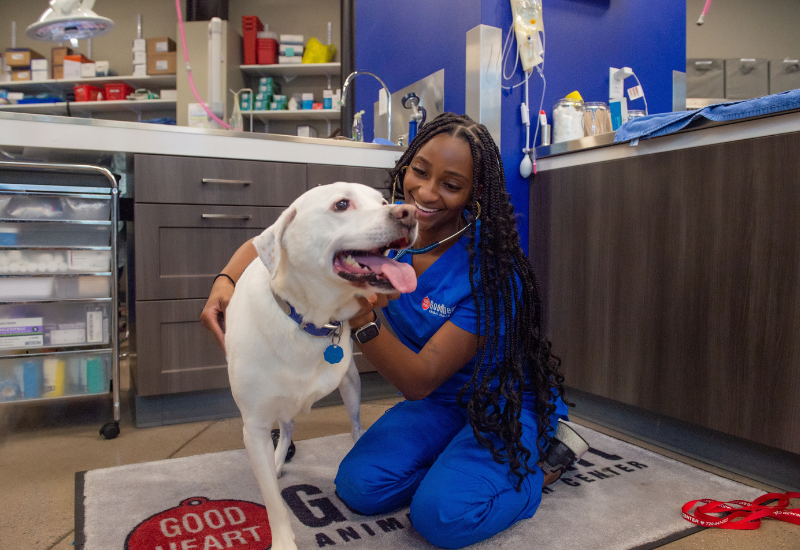Understanding the Unique Needs of Various Kinds Of Pets
Understanding the Unique Needs of Various Kinds Of Pets
Blog Article
Comprehending Your Pet Dogs' Nutritional Demands for Optimum Well-being

Relevance of Balanced Diets
Guaranteeing a well balanced diet plan for pet dogs is important for their overall health and wellness. A proper diet not only maintains life but also boosts the lifestyle by providing crucial nutrients that sustain various physical functions. Pet dogs, like people, require a blend of healthy proteins, carbs, vitamins, fats, and minerals to maintain ideal wellness. Each nutrient plays a distinct function; proteins are essential for cells repair work and development, fats provide energy and assistance cell function, while carbs act as a main power resource.
Integrating a range of nutrients guarantees that family pets maintain a durable immune system, healthy and balanced skin, and a shiny coat. Furthermore, a well balanced diet plan can protect against a host of health and wellness concerns such as obesity, which is linked to diabetes mellitus and joint issues, or malnutrition, which can lead to developing hold-ups and organ dysfunction.
Animal proprietors need to bear in mind part dimensions and caloric consumption, as overfeeding or underfeeding can have significant consequences. Consulting with vets or animal nutritionists can assist tailor diets to satisfy specific requirements, making sure that family pets obtain the suitable balance of nutrients required for their activity, size, and age level. A balanced and constant diet is indispensable for a family pet's durability and happiness.
Species-Specific Nutritional Demands
Exactly how do different types of family pets have differing nutritional requirements? This concern highlights the requirement for a customized strategy to feeding our animal buddies. Each species possesses distinct metabolic paths, digestion systems, and dietary demands that must be satisfied for optimum health. Dogs are omnivores, requiring a balanced diet of carbohydrates, healthy proteins, and fats, while cats, as obligate carnivores, require a greater protein consumption acquired primarily from animal resources.
Birds, depending upon their species, might require a diet plan abundant in fruits, bugs, or seeds, emphasizing the variety within the avian world. Pets. Reptiles, such as serpents and turtles, likewise need species-specific diet plans, with some needing high levels of calcium and others, a well-calibrated equilibrium of insects and plant matter
Understanding the dietary distinctions among various species is crucial for family pet owners. By catering and recognizing to these distinctions, we guarantee the provision of appropriate nourishment, sustaining the general health and wellbeing and vigor of our pets.
Age and Size Considerations
While species-specific dietary needs lay the foundation for an animal's age, diet and size additional refine these needs. Young pets, such as young puppies and kittens, call for diet plans rich in calories, proteins, and vital nutrients to support fast development and advancement. These young animals have higher metabolic rates and call for more frequent feedings to maintain their power levels and make sure proper development of body organs, muscle mass, and bones.
As animals age, their dietary requirements change substantially. Adult pets commonly need less calories than their younger equivalents yet still need a well balanced diet plan to maintain general health and wellness and vitality. Solutions designed for grown-up animals frequently concentrate on maintaining weight, promoting digestion health, and supporting an active way of living. On i was reading this the other hand, senior pet dogs may take advantage of specialized diet plans that attend to age-related difficulties, such as joint health, cognitive feature, and body organ assistance.

Health And Wellness Conditions and Dietary Adjustments
Specific health and wellness conditions can significantly affect the dietary needs of pet dogs, requiring customized dietary changes to sustain their health. Family pets with diabetes mellitus might benefit from diets that are high in fiber and reduced in easy carbohydrates to assist regulate blood sugar degrees. Obese Read More Here animals usually call for reduced-calorie diet regimens to promote weight loss and stop involved wellness complications.
Pet dogs with kidney illness might need diet plans low in phosphorus and healthy protein to ease kidney workload. Omega-3 fatty acids, recognized for their anti-inflammatory buildings, can be valuable for pets dealing with conditions like arthritis or inflammatory digestive tract disease. In addition, family pets with food allergies or intolerances might require hypoallergenic diet regimens, often needing a process of removal to identify and leave out offending ingredients.
Veterinary guidance is important when making dietary modifications, as inaccurate nutrition can exacerbate existing illness or cause new ones. Regular surveillance and modifications based on the animal's reaction to nutritional adjustments are important. A well balanced approach, taking into consideration both dietary and medical needs, makes sure that dietary treatments add positively to handling health and wellness problems, enhancing not just the animal's wellness however also their top quality of life.
Tips for Choosing High Quality Pet Dog Food
Picking the best family pet food is important for guaranteeing your family pet's health and long life. A well balanced diet sustains their body immune system, preserves healthy and balanced weight and advertises general vitality. Begin by consulting your vet to comprehend your pet dog's specific dietary needs based upon age, type, and wellness standing.
When reviewing animal food, inspect the component listing. High-grade pet foods commonly provide real meat, poultry, or fish as the key ingredient.
This indicates the food meets well established nutritional standards. Brand names with a background of recalls or poor high quality control need to be approached with care.
Think about whether your pet would gain from special formulations such as grain-free, high-protein, or limited-ingredient diet regimens. These can be helpful Click Here for animals with allergies or specific health and wellness issues. Observe your family pet's response to the food. Display their coat problem, power levels, and food digestion to ensure the diet regimen works.
Verdict
A thorough understanding of family pets' dietary requirements is crucial for promoting their optimal well-being. By sticking to these principles, family pet proprietors can significantly contribute to their pets' growth, energy degrees, and overall health and wellness, promoting a happier and much healthier life.

Picking the appropriate animal food is essential for guaranteeing your pet's wellness and long life. By sticking to these concepts, pet proprietors can significantly add to their animals' growth, power levels, and general health, promoting a happier and much healthier life.
Report this page